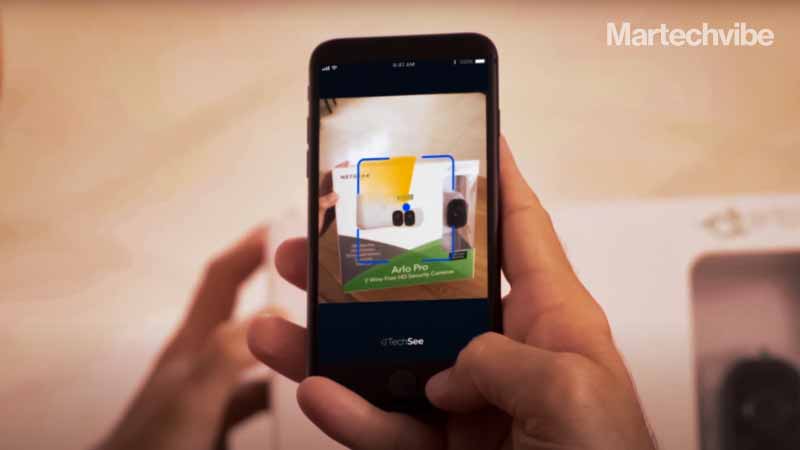TechSee Launches Scalable AR Assistant Platform Powered by Computer Vision AI
EVE Cortex utilises neural networks and synthetic data to learn in hours rather than months for powerful self-service applications. TechSee, the market leader in Computer Vision solutions for customer service announced the launch of EVE Cortex, the company’s next-generation artificial intelligence platform (AI) that teaches itself to recognise thousands of products, models, parts, and components […]
Topics

EVE Cortex utilises neural networks and synthetic data to learn in hours rather than months for powerful self-service applications.
TechSee, the market leader in Computer Vision solutions for customer service announced the launch of EVE Cortex, the company’s next-generation artificial intelligence platform (AI) that teaches itself to recognise thousands of products, models, parts, and components by ingesting only a handful of data points. EVE Cortex utilises a combination of patented AI neural networks and synthetic data to train itself in a matter of hours, making it the first truly scalable, interactive augmented reality (AR) self-service platform for widespread use across dozens of consumer and enterprise applications.
Here’s how EVE Cortex works.
Throughout the events of the past year, enterprises flocked to video and AR for customer engagement and began to realise the data from these interactions could be leveraged for AI solutions. But entities quickly learned having the data and actually being able to utilise it for a Computer Vision platform was no simple leap; specialised labour and unknown costs coupled with months and years of data collection and training was prohibitive. Using visual data to train AI to recognise thousands of consumer devices — let alone teaching it how to troubleshoot, repair, and upsell them — was a mountain that could not be conquered.
EVE Cortex builds on the industry’s first AR assistant introduced by TechSee in 2018 by enabling enterprises to configure their own visual self-service flows in less than half the time and at a fraction of the cost than previously possible. No knowledge of advanced coding, programming languages, or algorithmic science is necessary to configure journeys.
The result is a visual assistant that gives smartphones and tablets the ability to see what customers see. Users merely point their smartphone or tablet camera at a device for the AI to troubleshoot and resolve issues. There is no need to call customer support or wait hours for a technician.
“The future is here, and it’s time to say goodbye to user manuals and embrace AR assistants,” said Eitan Cohen, CEO of TechSee. “Virtual assistants that can see, hear, read, and interact are what’s going to transform the way that consumers and employees receive assistance, while saving brands millions and generating new revenue.”
Companies such as Vodafone, TELUS, Orange, and Hippo have begun using EVE Cortex to provide customers with step-by-step visual guidance with an easy AR overlay without the help of a customer support representative or in-person technician. “At Hippo, we’ve elevated the customer experience by offering tools and services that homeowners need to proactively protect their homes,” said Omeed Kazemi, Director of Business Operations at Hippo. “Our underwriting team leverages TechSee to obtain critical digital information during the onboarding process without having to schedule an in-person inspection and assists our Hippo Home Care team to remotely investigate home maintenance and repair issues that inevitably come up in homeownership. This information helps Hippo provide faster response times and high-quality care for our customers.”
Also Read: A Touch of Reality: AR, VR, and MR are Transforming Marketing
Enterprises, as a result, are saving millions of dollars by cutting call volumes, increasing first-contact resolution rates, reducing truck rolls and dispatches, decreasing product return rates, increasing upsells, and improving the customer experience.
“We’ve seen incredible innovation across numerous industries largely driven by necessity due to the global pandemic, and innovations in customer experience is no exception,” said Rich Osborn, managing partner, TELUS Ventures. “As an investor in TechSee, but more importantly as a customer and early adopter, TELUS recognises the opportunity EVE Cortex presents in delivering cutting edge improvements in the customer journey and accelerating access to support and resolution by revolutionising the DIY and self-serve experience for users.”
According to Gartner, only 9 per cent of self-service interactions are actually successful in resolving a customer’s issue; AR Assistants, a new market category that was introduced by TechSee in 2019, bring “smart eyes” to self-service channels and open a new world of use cases that previously couldn’t be addressed.
- Product unboxing – EVE Cortex walks consumers through unboxing and setup of various consumer electronics, from security cameras to mesh networks to smart thermostats.
- Product registration and warranty activation – Consumer electronics manufacturers and retailers use EVE to simplify warranty registration and capture customer information within seconds for unique upselling opportunities.
- Billing and invoice explainers – Service providers enable EVE to explain bills and invoices to consumers while reading physical devices such as water/gas/electrical meters and POS terminals.
- Insurance claims and underwriting assistance – Policyholders use EVE Cortex to capture damage to insured property or identify items they want to insure for virtual underwriting.
- Job verification – EVE Cortex certifies that an on-site field technician has made a successful repair by examining work via the technician’s smartphone or tablet camera or AR glasses. Tens of thousands of field service technicians in the US are already using it to install fiber optic boxes.









































































































